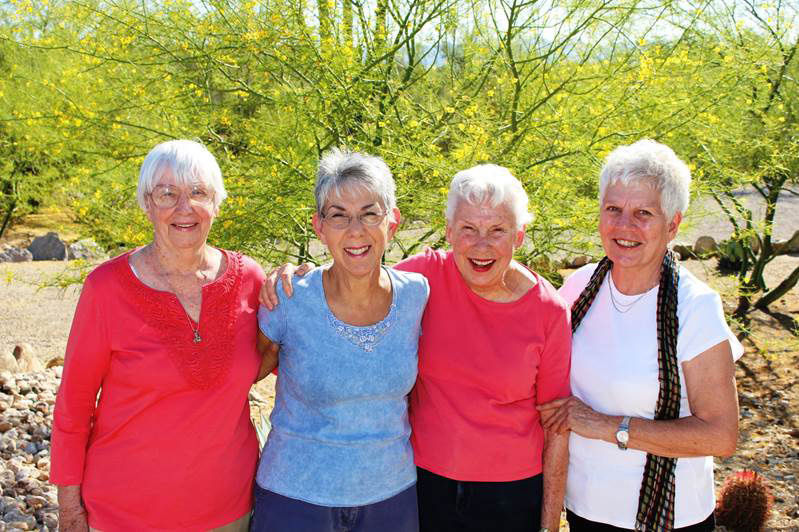In 1994, Carol Bogg, Linda Girard, Janet Smith and Jane Perri joined with a handful of volunteers to form the Tucson Interfaith HIV/AIDS Network. The group’s purpose was to help people with HIV and AIDS to die with dignity.
Now, after almost a century of collective volunteerism for TIHAN, their focus is on life.
“We’ve seen changes in our 22 years of working with HIV. The focus has moved from death in those early days to helping people to live well with this chronic, long-term disease,” said TIHAN Executive Director Scott Blades, who was recently honored for his decades of dedication with a prestigious Leadership Award from the United Methodist Global AIDS Fund. “For 22 years, these women and TIHAN have provided a sustained response. It is an amazing long-term commitment to HIV awareness, advocacy and support from these volunteers.”
Blades has nurtured the expansion of TIHAN, which boasts a membership of about 50 faith communities. The effort continues to provide education for clergy and laity along with outreach and support services for people living with HIV/AIDS, known as CarePartners.
Over the years, the four women agree, TIHAN has become more than an organization: It has become a family.
“Volunteering with TIHAN is sort of like being a mother: It is forever. The CarePartners in TIHAN and the volunteers you work with and the staff become your friends forever, and it is so encouraging to see the transitions over the years with medications and treatment,” said Perri, 81, a Catholic who became involved because she wanted to support her gay son and the gay community.
Smith reached out for the same reason after her son, Eric, died of AIDS at age 29, two years prior to the inception of TIHAN.
She said she regrets that Eric wasn’t able to take advantage of TIHAN’s services, but she is grateful for the comfort and support it offered during her mourning.
She is particularly thankful for the purpose that she found through the Poz Cafe, a volunteer-driven effort that offers monthly lunch and social programs for CarePartners. It also serves as a distribution point for CarePackages comprised of toiletries, cleaning and household supplies, clothing and other basic necessities essential to the many CarePartners who live on fixed incomes. The program is nearing another milestone: the distribution of its 10,000th CarePackage.
“Poz Cafe is one of the nicest and most gratifying things I have ever done, and I think it has done a great deal to eliminate the stigma attached to this disease. All of these wonderful men and women come from different congregations and work together and then go back to their congregations and remind them that these are just people — fine people who just have a virus,” Smith said.
The gratitude from CarePartners inspires many volunteers to return, according to Bogg, a strong advocate for equality and social justice who knew nothing about AIDS when she started at TIHAN.
“It is so exciting to see how happy they are to have us there. There are hugs and kisses and laughter from all sides,” she said.
Girard said the same spirit of optimism and inclusiveness abounds in TIHAN’s Living Well With HIV classes. The classes are led by instructors who educate CarePartners and guests on topics ranging from nutrition and budgeting to re-entering the workforce and optimizing well-being.
“We have the materials in Spanish and English so we can accommodate the entire population. We want to make sure that no one is excluded and everyone feels comfortable. This is all about educating and empowering people,” said Girard.
Ultimately, Blades said the importance of TIHAN’s sustained outreach is to bring people together. He said Treasures for TIHAN, the upcoming signature fundraiser, is an ideal opportunity to promote awareness and outreach while making new connections in the community.
“We want people to be part of the solution in providing resources and support for those living with HIV while addressing HIV stigma. Some people say HIV is too depressing or scary or they are afraid of getting it and we try to educate them so we can figure out where they fit in and how they can help support those who want to live well. It is hard to argue with that,” said Blades.
Through it all, Blades also reiterated the importance of overcoming the silence surrounding HIV and reminded the public of the importance of HIV testing.
“We thought HIV would be cured now, but it’s not — yet. For people living with HIV, it is a chronic but manageable disease so it doesn’t have to define or limit your life. For us as a society, it’s a long-term public-health issue, so we need more awareness, education, testing, support, advocacy and care,” he said.





